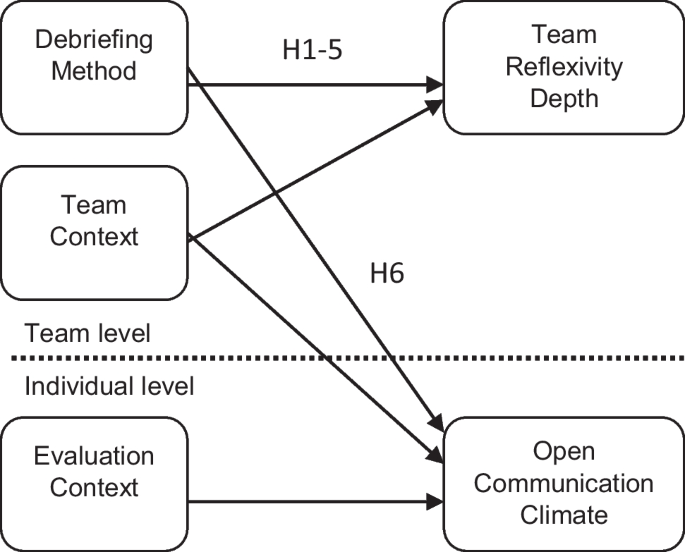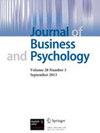Houston We Have a Problem: How Debriefing Method Impacts Open Communication and the Depth of Team Reflexivity
IF 4.9
2区 心理学
Q2 BUSINESS
引用次数: 0
Abstract
Abstract Team debriefings are structured interventions in which teams reflect on their past performance, adapt, and plan for future events. Results from meta-analyses indicate that team debriefings are effective in improving task performance (Keiser & Arthur, Journal of Applied Psychology , 106 (7), 1007–1032, 2021, Journal of Business and Psychology , 37 (5), 953–976, 2022; Tannenbaum & Cerasoli , Human Factors: The Journal of the Human Factors and Ergonomics Society, 55 (1), 231–245, 2013). Although far less often studied, there is also some evidence to suggest that team debriefings (compared to no debriefings) can be used to develop norms for open communication (Jarrett et al., Human Performance, 29 (5), 408-427, 2016; Villado & Arthur, Journal of Applied Psychology, 98 (3), 514-528, 2013). However, there is currently a dearth of quantitative evidence to guide practitioners in selecting from the myriad methods available to achieve this purpose. Grounded in theory and research on episodic models of team performance (Marks et al., Academy of Management Review, 26 (3), 356-376, 2001) and the Motivated Information Processing in Groups model (MIP-G) (De Dreu et al., Personality and Social Psychology Review, 12 (1), 22–49, 2008), we conducted a quasi-experiment which compared two debriefing methods. The first, a chronological debriefing, emphasizes outcome accountability and makes competitive interdependence salient, whereas the second method, Team Dimensional Training (TDT), emphasizes process accountability and makes cooperative interdependence salient. Data from 76 flight controllers at Johnson Space Center indicated that the communication climate in TDT debriefings was perceived to be more open than was the climate in chronological debriefings. Analyses of coded transcripts from 69 debriefings revealed that teams engaged in deeper reflexivity when the TDT method was used than they did when the chronological method was used.

我们有一个问题:汇报方法如何影响开放的沟通和团队反思的深度
摘要团队汇报是一种结构化的干预,在这种干预中,团队反思他们过去的表现、适应和计划未来的事件。meta分析的结果表明,团队汇报对提高任务绩效是有效的(Keiser &王晓明,应用心理学报,106(7),1007-1032,2021,商业心理学报,37 (5),953-976,2022;坦南鲍姆和双重周建军,刘建军。人机工程学报,2011,31(1),344 - 344,2013。虽然很少有人研究,但也有一些证据表明,团队汇报(与没有汇报相比)可以用来制定开放沟通的规范(Jarrett等人,Human Performance, 29 (5), 408- 427,2016;Villado,王晓明,杨晓明。心理科学学报,2009(3),514-528,2013。然而,目前缺乏定量证据来指导从业者从无数可用的方法中进行选择,以实现这一目的。基于团队绩效情景模型(Marks et al., Academy of Management Review, 26(3), 356-376, 2001)和团队动机信息加工模型(MIP-G) (De Dreu et al., Personality and Social Psychology Review, 12(1), 22-49, 2008)的理论和研究,我们进行了一个准实验,比较了两种汇报方法。第一种方法是按时间顺序进行汇报,强调结果问责制,突出竞争相互依赖;而第二种方法是团队维度训练(TDT),强调过程问责制,突出合作相互依赖。来自约翰逊航天中心76名飞行控制员的数据表明,TDT汇报中的沟通气氛被认为比按时间顺序汇报的气氛更开放。对69份汇报的编码文本的分析表明,当使用TDT方法时,团队的反身性比使用时间顺序方法时更深。
本文章由计算机程序翻译,如有差异,请以英文原文为准。
求助全文
约1分钟内获得全文
求助全文
来源期刊

Journal of Business and Psychology
Multiple-
CiteScore
8.80
自引率
4.20%
发文量
70
期刊介绍:
The Journal of Business and Psychology (JBP) is an international outlet publishing high quality research designed to advance organizational science and practice. Since its inception in 1986, the journal has published impactful scholarship in Industrial/Organizational Psychology, Organizational Behavior, Human Resources Management, Work Psychology, Occupational Psychology, and Vocational Psychology.
Typical subject matters include
Team processes and effectiveness
Customer service and satisfaction
Employee recruitment, selection, and promotion
Employee engagement and withdrawal
Organizational culture and climate
Training, development and coaching
Mentoring and socialization
Performance management, appraisal and feedback
Workplace diversity
Leadership
Workplace health, stress, and safety
Employee attitudes and satisfaction
Careers and retirement
Organizational communication
Technology and work
Employee motivation and job design
Organizational change and development
Employee citizenship and deviance
Organizational effectiveness
Work-nonwork/work-family
Rigorous quantitative, qualitative, field-based, and lab-based empirical studies are welcome. Interdisciplinary scholarship is valued and encouraged. Submitted manuscripts should be well-grounded conceptually and make meaningful contributions to scientific understandingsand/or the advancement of science-based practice.
The Journal of Business and Psychology is
- A high quality/impactful outlet for organizational science research
- A journal dedicated to bridging the science/practice divide
- A journal striving to create interdisciplinary connections
For details on submitting manuscripts, please read the author guidelines found in the far right menu.
 求助内容:
求助内容: 应助结果提醒方式:
应助结果提醒方式:


